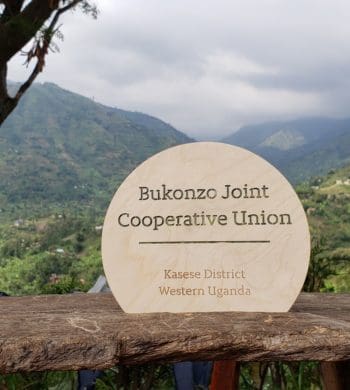At 4,321 meters, Mt. Elgon, in the far eastern region of Uganda, is a sprawling territory with plenty of space for numerous cooperatives and coffee collection centers. Mbale town is the area’s commercial center and home to most of Mt. Elgon’s dry mills and coffee warehouses.
Even though Mt. Elgon Agroforestry Communities Cooperative Enterprise (MEACCE, pronounced mee-ack) officially formed in July 2017, in many ways it has the energy and drive of a younger startup. While Uganda produces 2.3% of the world’s total coffee supply, around 80% of the country’s coffee production is Robusta grown in the central and northern lowlands. Uganda’s washed Arabica coffee, better known in the specialty coffee realm, is mainly produced in the southwest (Kasese area), the northwest (West Nile region), and in the east near Mt. Elgon.
MEACCE developed in July 2017 from the remnants of an older, poorly-run cooperative. Not wanting to be “the same beer in a different bottle,” the founding members prioritized sharing of information about finances, trainings, and governance among their peers. They strategically partnered with an exporter from the get-go, and MEACCE produced 7 containers in their first season (2017-2018) and have since grown to around 35 containers of fully washed, farmer washed, and natural process annually. MEACCE has 3,282 (with 655 women) members, and most members have around 600 coffee trees on backyard plots.
For their farmer-washed coffee, members depulp and dry parchment at their houses and then deliver the dried parchment to a central location for processing. Only a small number of farmers own their own depulpers, and those with equipment allow other members to use the pulpers for a small fee. After floating cherries in a bucket and removing the floaters, they depulp and dry ferment in buckets or poly sacks for 24-48 hours. After fermentation they bucket wash the parchment, then dry it on raised beds or tarps for 3-4 weeks before delivering to the primary society’s storehouse. At the primary society, staff take a moisture meter reading, hull a sample and sort for defects. The parchment is then delivered 2-3 times/week to MEACCE’s main store in Mbeya where it is again measured for moisture and defects by John, MEACCE’s QC Manager. If the parchment doesn’t meet MEACCE’s quality standards MEACCE provides a space for additional drying and sorting on the premises.
In storage, the parchment is kept separate by primary society and each ~70kg bag of parchment is labeled by date, primary society name, lot and bag number. Once MEACCE has enough parchment for a container’s worth of green coffee they will send it to a third-party miller to be milled and graded. MEACCE will then hand-sort before the coffee is bagged and sealed for export to Mombasa, Kenya.
MEACCE also produces small amounts of fully washed and natural process coffee, and has constructed 3 micro washing stations.
Luke Wepukhulu, MEACCE’s Director of Operations shared the following with me during a visit in February 2020:
“We want to create a difference, pass on value to farmers. Once a farmer appreciates his or her value as a member of the cooperative, and receive second payments and Fair Trade premiums, then he or she will be even more motivated to comply with our requirements of quality…In our meetings now, many farmers are speaking, questioning, and sharing their thoughts, instead of just one or two.”
“Things are happening. We are getting our farmers involved in decision making, teaching board members and (farmer) members about how pricing is determined, teaching about the idea of ‘export selling’. If farmers delivery cherry and parchment on credit, and wait on payment until the cooperative is paid by the importer, the farmer will not only receive more, but the cooperative will have to borrow less from the bank, allowing them to invest more capital back into the cooperative.”
Of course MEACCE faces challenges like many other groups. Coffee berry disease and coffee white stem borer are perennial plant problems, and climate change has increased danger from a more extreme flood/drought cycle, and even hailstorms which can be very damaging to coffee.
As an umbrella cooperative, MEACCE is eager to build a small lab and learn about sample roasting and cupping in order to better support advise their members. With time farmers are rebuilding trust in the cooperative structure, understanding that progress takes perseverance. They’re focused on good agricultural practices including maintenance of trenches for water conservation, pits for organic composting, stumping trees every 5-8 years to maximize productivity. Each primary society cooperatives includes multiple 20-30 member farmer groups where they establish microfinance partnerships and implement farmer field schools to share information.
Atlas has been working with MEACCE for several years, importing their coffee for specific clients, and are happy to now bring this coffee in for our offer list. With Fairtrade and Organic certification, and notes of plum, raisin, lemon, spice, and toffee with a medium acidity and body, the coffee will be at home as both a single origin or blend component.
